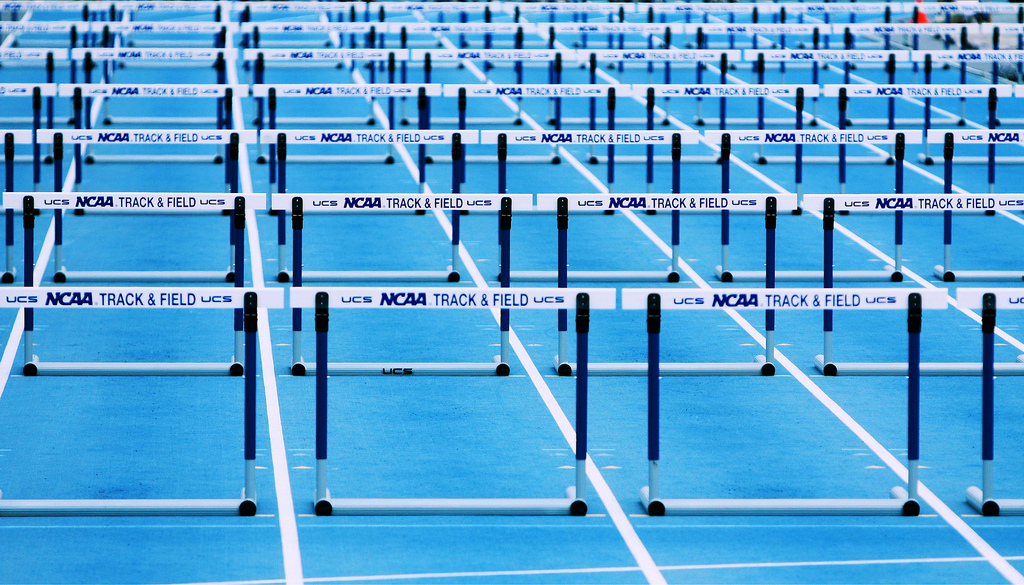Against Testosterone Testing in Sports
The International Association of Athletic Federations (IAAF) has returned to the policy that female competitors must have circulating testosterone under a certain level. The policy had been suspended as a result of a judgment by the Court of Arbitration for Sport, after a complaint was filed by Dutee Chand, an Indian runner with DSD (differences of sexual development, also known as being intersex). For now, the new policy will apply only to mid-distance events—400 meters to a mile—and to people legally recognized as either female or intersex (which presumably includes trans women). More details on how the policy will be implemented are here.
The testosterone rule will have a serious impact on the best known DSD athlete in the running world, Caster Semenya. While a similar rule was on hold, Semenya won gold in the 800 meters at the 2012 and 2016 Olympics. To compete in that event in the future, her testosterone will have to be under 5 nmol/L during the competition and for six months prior. This might require hormone therapy that could give her a more feminine appearance and alter her performance. And if she didn’t want to reduce her testosterone? Then she would have the option of competing against men.
Are these reasonable rules? Ideally, ethical tools allow us to make up our minds about matters of public concern, putting us in a position to make recommendations or even become advocates. In this case, I find that ethical analysis leads in two different directions. Instead of making one argument, I’m going to make two—one in this post and the other in a later post. You decide which is the better argument. (Full disclosure: I don’t know.)
The first thing to note is that testosterone testing is extremely problematic to those who are tested. Intersex athletes may not even know that they are intersex until testing. Though the IAAF insists they only care about eligibility, those who find out they have testosterone levels over the limit may find out they have one of many different intersex conditions. Among other possibilities, they may find out they have a “Y” chromosome and/or undescended testes.
This won’t pose any challenge to the female gender identity of these athletes if they’re well-schooled in contemporary philosophies of gender, but most athletes are not. Given their personal background and home culture, they may experience the new information as a challenge to their identity as women. In a moving New York Times article, Ruth Padawer explains how, after discovering their DSD and being disqualified, athletes have been abandoned by boyfriends and fiances, and have even attempted suicide.
The practice of testosterone testing is particularly galling because it’s the exceptional performer who attracts suspicion. Testosterone testing forces all women to worry about being too good. The winningest female athletes are vulnerable to having their femininity called into question, whereas it’s just the opposite for the winningest male athletes. They are taken to be especially masculine.
These impacts pertain to intersex female athletes, not transgender athletes, since trans women wouldn’t learn anything about themselves they didn’t already know, as a result of the testing. But there are other sequelae for trans women: though testosterone testing is supposed to be a matter of mere eligibility for competition, they are likely to feel as if their womanhood is called into question by a finding of excess testosterone.
If testosterone testing were really needed, to keep sports fair, it could perhaps be justified. But the next part of the anti-testing argument calls into question whether it’s needed to keep sports fair. Rachel McKinnon, a philosopher as well as an athlete and a trans woman, does an effective job of articulating these doubts (along with her coauthor, Aryn Conrad—see also here). She emphasizes that what’s at issue here is testing for endogenous testosterone—hormones naturally made by the athlete’s body. They may confer an athletic advantage, but so do other built-in physical attributes. It’s better to be tall if you’re a basketball player, and better to be short if you’re a gymnast. People aren’t disqualified from playing basketball because they’re unusually tall and they’re not disqualified from being gymnasts because they’re unusually short.
And in any case, high endogenous testosterone isn’t as advantageous as generally thought, McKinnon argues: it confers different levels of advantage in different sports, the average being 3 percent. Exceptional height—not disqualifying in the least—confers more advantage on basketball players. It’s absurd to allow athletes to have natural traits that make them better at sports in every case, but not in the case of testosterone.
McKinnon gives more depth to her argument by invoking the test for justice proposed by the philosopher John Rawls: Would we choose testosterone testing in The Original Position, behind The Veil of Ignorance? That is, suppose we are planning for a future society and setting up policies and practices. The principles that are just, according to Rawls, are the ones that we would choose if we didn’t know what our attributes would be in the society governed by those principles: cis or trans, DSD or not, male or female, athlete, spectator, or indifferent to sports? Not knowing who we will be, McKinnon thinks we will reject policies that will tend to harm and exclude trans and intersex women.
The IAAF has made a mistake. On grounds of harmfulness as well fairness there should be no limits on endogenous testosterone.
Stay tuned. In my next post, I’ll present an argument in support of the IAAF’s testosterone rule.





